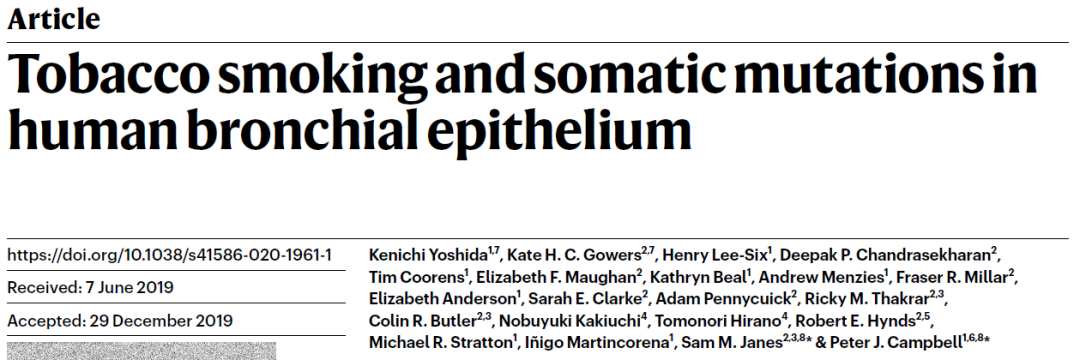来源:BioWorld
烟草中含有超过60种致癌物,这些致癌物可以直接导致DNA损伤和突变【1,2】,这也是吸烟可以引发肺癌的原因【3-5】。之前的工作往往关注于烟草对肺癌细胞的影响【6-10】,但是,烟草对于正常的支气管体细胞的影响却知之甚少。
2020年1月30日,来自英国的Sam M. Janes和Peter J. Campbell团队在 Nature 杂志上发表了题为:Tobacco smoking and somatic mutations in human bronchial epithelium 的研究论文,发现吸烟可以升高肿瘤突变负荷(tumor mutational burden,简称TMB,指的是每百万碱基中被检测出的体细胞基因编码错误,碱基替换,基因插入或缺失的错误的总数),细胞-细胞异质性(cell-to-cell heterogeneity)和驱动基因(driver genes)突变。但是,值得庆幸的是,及时戒烟可以有效地减少烟草所导致的体细胞基因突变。

作者招募了16位志愿者作为研究对象,其中3位儿童,4位从未吸过烟的成年人,6位戒烟者以及3位吸烟者。通过流式细胞术的方法,收集上皮细胞标志分子EpCAM阳性的支气管上皮细胞,并分别进行体外培养扩增。最终,收集到632个支气管上皮细胞克隆。
接下来,作者通过基因组测序发现,不同的研究对象,甚至是同一研究对象的不同细胞克隆,单碱基突变(somatic substitutions)都具有明显的异质性。通过LME模型(Linear mixed-effects),作者发现,随着志愿者年龄的增长,单碱基突变水平也明显上升,上升速率为每年长一岁,每个细胞增加22个碱基突变(95%,置信区间20~25,P = 10−8)。而对于戒烟者和吸烟者来说,形势则更为严峻。戒烟者每个细胞增加2330个碱基突变(95%,置信区间1180~3480,P = 0.0002),而吸烟者则高达5300个(95%,置信区间3660~6930)。
烟草中的有毒物质(外因)和DNA损伤(内因)都可以导致细胞突变,而这些因素在基因组中都有迹可循【8】,即有独特的突变特征(mutational signature)。作者逐个病例分析,并加入已报导结果【11】,发现突变较少的细胞(每细胞10~30个)具有突变特征SBS-18,这一特征(signature)多出现于对照组中【12】。大部分具有突变特征SBS-5,这一特征与年龄线性正相关,并且,已经有报道指出,具有吸烟史的志愿者们,这一特征的含量更高(戒烟者每个细胞1140个碱基突变, 95%,置信区间590~1700;吸烟者每个细胞2200个碱基突变, 95%置信区间,1590~2810, P < 10−16)。突变特征SBS-1主要出现在儿童中,但是,如果仅关注于成年人,这一特征也与年龄线性正相关。
最后,作者试图通过计算生物学的方法,推测出是否在正常支气管上皮细胞中,也存在一类吸烟所导致的基因突变,作者将这些基因,定义为驱动基因(driver genes)。在检测的所有基因中,下述三个基因具有明显的相关性,包括NOTCH1(20 个独特的非同义变体,即unique non-synonymous variants;q = 1 × 10−5);TP53(7个独特的非同义变体;q = 2 × 10−4)和 ARID2 (7个独特的非同义变体;q = 4 × 10−4)。如果仅仅关注肺癌细胞和鳞状组织细胞(normal squamous tissues),这些基因,包括FAT1,PTEN,CHEK2和ARID1A,也同样具有明显相关性。作者还发现,这些驱动基因突变,大部分是在具有吸烟史的志愿者中发现。具体来讲,没有儿童具有这些驱动基因突变,从未吸过烟的成年人4~14%的细胞中具有这些基因突变,而吸烟者的比例则是25%,并且,近6%的细胞甚至含有两个到三个这样的点突变。
综上所述,作者通过16位志愿者的632个支气管上皮细胞克隆研究发现,吸烟是升高支气管上皮细胞肿瘤突变负荷的元凶之一,基本上从每个细胞1000个突变急剧升高至10000个。突变因人而异,甚至同一人因细胞而异。驱动基因突变频率随着年龄增长而呈现线性正相关关系,且影响着从未吸烟者的4~14%的细胞。与此同时,吸烟者至少25%的细胞携带这些驱动基因突变,并且,近6%的细胞甚至含有两个到三个这样的点突变。因此,为了您和他人的健康着想,请勿吸烟,尽早戒烟。
论文链接:
https://doi.org/10.1038/s41586-020-1961-1
参考文献
1. Hecht, S. S. Progress and challenges in selected areas of tobacco carcinogenesis. Chem. Res. Toxicol. 21, 160–171 (2008).
2. Pfeifer, G. P. et al. Tobacco smoke carcinogens, DNA damage and p53 mutations in smoking-associated cancers. Oncogene 21, 7435–7451 (2002).
3. Alberg, A. J., Brock, M. V., Ford, J. G., Samet, J. M. & Spivack, S. D. Epidemiology of lung cancer. Diagnosis and management of lung cancer, 3rd ed: American College of Chest Physicians evidence-based clinical practice guidelines. Chest 143, e1S–e29S (2013).
4. Peto, R. et al. Smoking, smoking cessation, and lung cancer in the UK since 1950: combination of national statistics with two case-control studies. Br. Med. J. 321, 323–329 (2000).
5. International Agency for Research on Cancer. Tobacco Smoke and Involuntary Smoking. IARC Monographs on the Evaluation of Carcinogenic Risks to Humans Vol. 83 (IARC and World Health Organization, 2004).
6. Pleasance, E. D. et al. A small-cell lung cancer genome with complex signatures of tobacco exposure. Nature 463, 184–190 (2010).
7. Imielinski, M. et al. Mapping the hallmarks of lung adenocarcinoma with massively parallel sequencing. Cell 150, 1107–1120 (2012).
8. Alexandrov, L. B. et al. Mutational signatures associated with tobacco smoking in human cancer. Science 354, 618–622 (2016).
9. George, J. et al. Comprehensive genomic profiles of small cell lung cancer. Nature 524, 47–53 (2015).
10. Jamal-Hanjani, M. et al. Tracking the evolution of non-small-cell lung cancer. N. Engl. J. Med. 376, 2109–2121 (2017).
11. Cancer Genome Atlas Research Network. Comprehensive genomic characterization of squamous cell lung cancers. Nature 489, 519–525 (2012).
12. Kucab, J. E. et al. A compendium of mutational signatures of environmental agents. Cell 177, 821–836 (2019).
来源:ibioworld BioWorld
原文链接:https://mp.weixin.qq.com/s?__biz=MzU1MzMxMzcyMg==&mid=2247496725&idx=4&sn=20df1faa7e587bf1968d9b37366fad46&chksm=fbf600c0cc8189d6a148aefaa8e62f432d041706ae4c72bbae14090f49ad4b9dd22c0ac158d0#rd
版权声明:除非特别注明,本站所载内容来源于互联网、微信公众号等公开渠道,不代表本站观点,仅供参考、交流、公益传播之目的。转载的稿件版权归原作者或机构所有,如有侵权,请联系删除。
电话:(010)86409582
邮箱:kejie@scimall.org.cn




